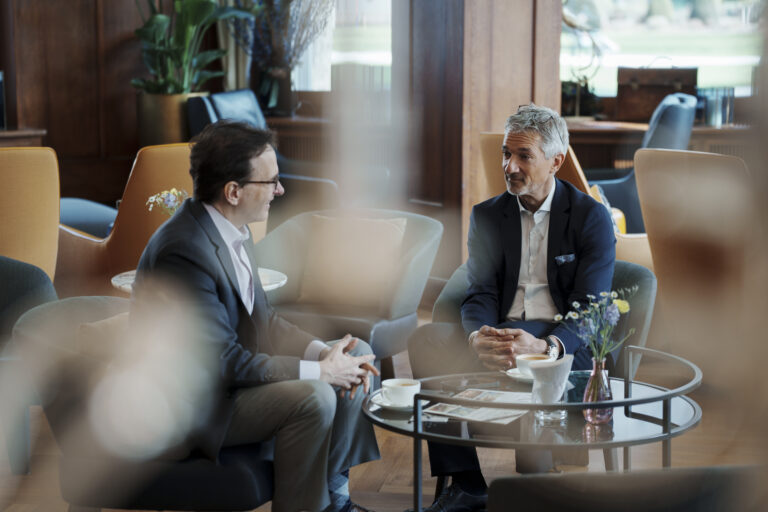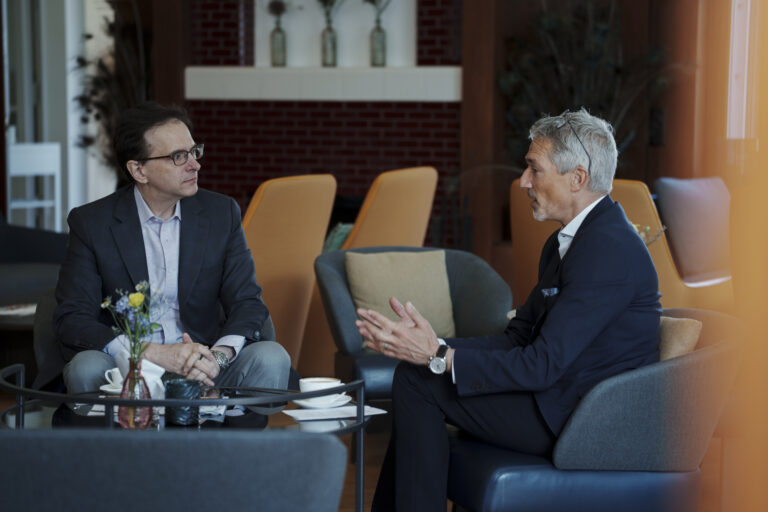Tim Romero came to Japan decades ago—not to build a startup, but to play music. What followed was a journey through startups, exits, corporate innovation roles, and most recently, a seat at the forefront of Japan’s energy transformation with JERA Ventures. He’s also the voice behind Disrupting Japan, the longest-running English-language podcast on Japanese entrepreneurship.
In this wide-ranging conversation, Christoph Frei (Partner & Head of Energy at Emerald) explores how Tim’s unlikely trajectory—spanning music, Silicon Valley-style entrepreneurship, and deep dives into the energy sector—has shaped his take on innovation, risk, and transformation. From hard-won lessons to honest takes on what Japan gets right and wrong, this is a rare look at how one outsider learned to speak the language of disruption from inside one of the most conservative corporate cultures in the world.
Rock Star, Rock Wall, Rocky Ride
Christoph Frei: I want to start with something that struck me the first time we spoke: your path into innovation is not what you’d expect. You came to Japan as a musician?
Tim Romero: That’s right. It sounds chaotic, but each move made perfect sense at the time. I came to Japan because a record label brought me over. I was a professional musician. It was fun, but ultimately a brutal career. So I moved back to LA, played for another few years, and then just hit a wall. I was burned out.
So I pivoted. Ended up at a trading company, which transferred me back to Japan. Then in 1998, this whole Internet thing started looking interesting, so I quit and started my first startup. Sold it. Then started a few more—some exits, some failures. It’s been a bit of a ride.
Startups, TEPCO, Google, and Back to Energy
Frei: You’ve been in startups, you’ve done angel investing, you ran Google for Startups Japan, and you were part of TEPCO Ventures before landing at JERA. That’s a spectrum—from chaos to corporate.
Romero: Totally. And the funny thing is, I found more room for genuine innovation at TEPCO than I did at Google. People assume the opposite, but in traditional companies, if you’re in CVC, you are the tip of the spear for change. You’re expected to shake things up. At Google, everyone thinks they’re an innovator already. There are systems and rails to keep people from drifting too far off course.
So, for me, the role matters more than the organization. Innovation happens when your mandate is to make things new—regardless of how conservative the company is.
Frei: What are you looking for when you invest through JERA Ventures? What’s the “spark”?
Romero: I get excited pretty easily. I like to be around people solving problems that matter. Some of our investments are these big, transformative bets—startups that could change how the energy system works. Others are smaller, more targeted. Maybe they’ll never be unicorns, but they’re solving something important for a specific niche. They can still be excellent investments.
I do gravitate more toward the big-picture ones—just because I like complex problems. But honestly, it’s about energy, impact, and execution. Are they serious? Are they solving something real?

Innovation as an Outsider: Why Japan is a Unique Case
Frei: You’re not Japanese, but you’ve been there a long time. What’s it like driving innovation as an outsider in Japan?
Romero: That outsider perspective is powerful. I think that’s true in any startup ecosystem—San Francisco, London, Tokyo. Foreigners are often the ones pushing boundaries. You’re not bound by local assumptions. That gives you an edge, if you play it right.
But especially in Japan, it helps to be very clear about your value. What’s the unique thing you bring to the table? Because this is a protocol-heavy culture. It’s not about being loud; it’s about being relevant in the right way.
Frei: So… you run the podcast Disrupting Japan. Where does Japan most need to be disrupted?
Romero: Great question. And a big one.
If you look back to the 60s and 70s, Japanese companies were the disruptors—in cameras, watches, cars, semiconductors. They were relentlessly focused on global excellence. They knew what was happening everywhere, and they moved aggressively.
That edge? That sense of paranoia? It’s faded. Companies got comfortable. It’s not a language issue or a lack of talent. It’s about curiosity. If Japanese enterprises can rediscover that global mindset, they’ll be an unstoppable force again.
Frei: How’s the startup scene evolved since you started the podcast?
Romero: Night and day.
When I started Disrupting Japan, founders had wild origin stories—living in their cars, family disowning them, pawning wedding rings. It was dramatic and tough. Now? Venture capital is available. Universities support founders. Families aren’t horrified anymore. Society gets it.
That makes for way worse podcast content—but it’s fantastic progress. Japan is a very solid place to start a company now.
Energy in Japan: Tension Between Vision and Reality
Frei: Let’s move to energy. What’s the core challenge in Japan’s energy transition?
Romero: It’s the trade-off between sustainability and cost. Everyone wants a greener grid, and there’s political and social will for it. But Japan already has high electricity prices. Push them much higher and you start hurting the economy.
So it’s a balancing act. And it’s hard. But necessary.
Frei: Nuclear seems to be back on the table. What’s your take?
Romero: It’s happening. The government has made it very clear they want nukes back in the mix—something like 21% by 2030. Whether they hit that number is another story—the plants aren’t all ready yet—but the intention is unmistakable.
We’re also going to see more offshore wind, especially in Hokkaido, and maybe a real second life for geothermal. Japan’s actually perfect for geothermal from an engineering standpoint, but the first wave was rolled out poorly in the 70s. Bad PR still lingers.
Frei: So, what’s JERA doing to move the needle?
Romero: We’re pushing hard. Offshore wind, for example—we’ve got a JV with BP and several projects in Hokkaido. And we’re experimenting with ammonia co-firing. In fact, we ran the world’s first ammonia-coal co-firing plant—20% ammonia, 80% coal. The goal is to flip that ratio over time.
We’re also exploring hydrogen-natural gas blending. These are bridges—ways to decarbonize the current fleet without waiting for 100% solar and wind.
Frei: JERA Ventures is still quite young. How do you see its role?
Romero: We’re about 2 years in. Six portfolio companies now—split between molecules and carbon management. As we get deeper into the organization, build more trust, our role expands.
We’re not just placing financial bets. We’re helping shape the company’s transformation. That’s the mandate. Help JERA diversify, evolve, and stay ahead of the curve.

Timing is Everything: Advice for Energy Startups Eyeing Japan
Frei: Let’s say I’m an energy startup with an asset-heavy business model. I want to come to Japan. When do I engage? What do you want to see?
Romero: This is crucial. Don’t do your first pilot in Japan. Things go wrong in early pilots—that’s normal—but in a consensus-driven culture like Japan, that can kill momentum.
Do your pilot elsewhere. Then come to Japan with real data, something that works. That’s when it becomes a question of integration, not risk.
Once a tech works at one Japanese utility, the rest tend to follow. But you have to get that first step right.
Frei: Do you have a favorite example of someone entering the Japanese market the right way?
Romero: Yes, but it’s from software, not energy.
Alan Miner—he brought Oracle and Salesforce to Japan. Oracle wasn’t the top database at the time, but he positioned it as the global standard here. Big flashy events. Strong narrative. And the product delivered.
It was masterful. He built confidence and excitement around something new. That’s what you need in Japan—reliability and vision, packaged together.
Frei: If a young Japanese founder came to you for advice—what are the three things you’d tell them?
Romero:
- Be aspirational, but grounded. Don’t talk like a Silicon Valley pitch deck. Saying you’ve “revolutionized” an industry with a PowerPoint and a mock-up will kill your credibility in Japan.
- Play the long game. Japanese companies aren’t transactional. One pilot isn’t just a test—it’s a relationship that could last years.
- Don’t fake it. Trust builds over time. Be honest about what you can do and where you’re heading. People here value that.
The Man Behind the Lyrics
Frei: On your LinkedIn, you quote the Steve Miller Band—“I’m a picker, I’m a grinner, I’m a lover, and I’m a sinner…” What’s behind that?
Romero: (laughs) Fewer people get that reference every year. But it’s always been part of how I see myself.
I’ve always been a bit of a contrarian. Even with my podcast bio—I wrote this long, rambling 5,000-word life story just because I was sick of those generic bios. And I got amazing responses from people who felt the same.
That line on LinkedIn? It’s a reminder that I’m not just an investor or podcaster or executive. I’m still that guy with a guitar who decided to try something crazy and build a life in Japan.
More on Energy at Emerald:
Solving energy demand for data centers – an interview with Graham Carey
Accelerating Action: Barbara Burger shares CVC leadership lessons in energy
